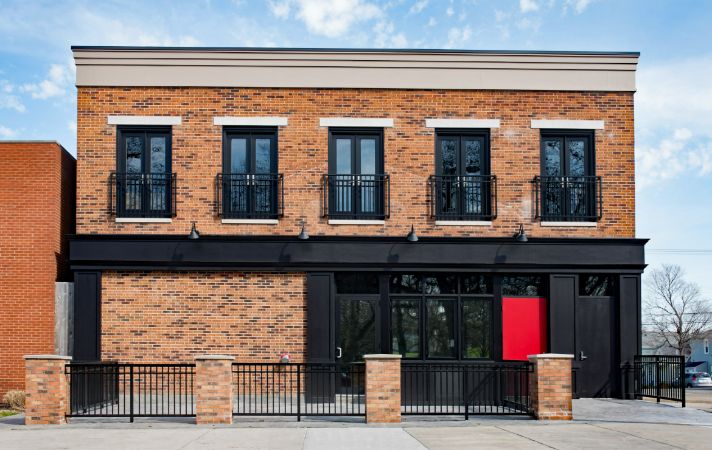Buying or selling a commercial property can bring with it a lot more risk than with residential properties.
Larger investments are usually at stake and getting something wrong could cause huge financial burdens.
As commercial property solicitors, we have experience in dealing with the buying, selling, refinancing and developing of commercial property.
In this post, we will focus on the selling aspect of commercial property.
We aim to give a comprehensive overview of this topic so you are fully aware of what to expect should you embark on this endeavour.
What is classed as commercial property?

Commercial property refers to real estate primarily used for business or income-generating purposes rather than residential living.
It encompasses a wide range of properties, including:
- Office buildings.
- Retail spaces.
- Industrial warehouses.
- Hotels.
- Restaurants.
- Land zoned for business or industrial use.
Essentially, any property that is not intended for private habitation and is used for trade, commerce, or investment falls into the category of commercial real estate.
These properties serve as locations for businesses to operate, generate revenue, or lease to other businesses.
Steps to selling commercial property

The selling of commercial property can be a complicated process.
You must be aware of numerous factors to ensure legislation is followed. Here are the steps that are involved in selling commercial property:
Set your goals and objectives
It’s important to set out what you want your end result to be. That way, you can measure if the sale was successful.
It’s also good to have clear objectives throughout the sale process so you can set your expectations and stick to your plan.
Of course not everything goes to plan when it comes to selling commercial property, you will need to be adaptable in some cases.
Even though the plan may change it’s still good practice to clearly state your goals and objectives.
Communicate with your buyer
Communication is key during selling negotiations. Both parties will need to have an understanding of each other’s expectations.
When you know what a buyer is looking for you’ll be able to know whether your property is suitable or not for them.
Their main concerns will consist of:
- Location.
- Suitability.
- Price.
You could arrange to have a pre-made package full of relevant documents including an asbestos survey, planning permissions and building regulations, fire risk assessment, gas and electrical certificates and any other relevant information.
This could prompt them to make a quicker decision as they will have all the relevant documentation without having to go back and forth.
In commercial property, there can be high stakes involved so any miscommunication can incur devastating consequences.
Liaise with solicitors
You’ll need the guidance of a commercial property solicitor to help you navigate this process. If you were to choose an experienced commercial property solicitor such as Brown Turner Ross we would have several duties, including:
- Drafting the sale contract
- Preparing a comprehensive package of title documents
- Assisting you in the provision of the required supplemental documents
- Dealing with any enquiries that will be raised by the Buyer’s solicitors
- The exchanging of contracts.
- Dealing with any irregular issues that may arise
- Answering any legal questions you may have.
We help you feel at ease during the selling process which is why our experienced staff are always on hand to assist you.
Due diligence
Due diligence will be carried out by the commercial property solicitor of the buying party.
This is a critical step in the transaction process as it allows the buyer to thoroughly investigate the property, and it’s legal title to ensure that they are making an informed and safe investment.
Here are the key aspects of due diligence when selling a commercial property:
- Inspections and property condition – Buyers may conduct property inspections to evaluate the physical condition of the building. This can include structural inspections, environmental assessments, and evaluations of HVAC systems, plumbing, and electrical systems.
- Title search and legal status – Buyers will examine the title to verify that the title is clear of any liens, encumbrances, or legal issues that could affect the property’s ownership. They will also review any existing easements or covenants that may affect the property. This will include reviewing the lease if the property is Leasehold and ensuring that consent from the Freeholder is obtained if required.
- Lease agreements – If the property has tenants, buyers will review all lease agreements to understand the terms, rent amounts, lease expiration dates, and any lease terms[JD1] ..
- Planning and compliance – Buyers will confirm that the property complies with local building requirements or and regulations. They will also check for any outstanding planning or building regulation violations.
- Survey and boundary verification – Buyers may order a building survey to verify the property boundaries, easements, and general condition.
Sellers should be prepared to provide accurate and complete information to facilitate this process, and buyers should use this stage to assess the property thoroughly before they decide to buy a commercial property.
Negotiations
Negotiations during the sale of a commercial property are a pivotal phase where both sellers and buyers aim to reach mutually beneficial terms.
These negotiations usually revolve around the price, or perhaps repairs or improvements required after inspections.
Throughout this process, both parties must find a middle ground to address concerns, balance risks, and agree on a clear and legally binding purchase and sale agreement.
This should outline the rights, obligations, and conditions for the transfer of the commercial property.
Effective negotiation skills and collaboration with experienced professionals, such as real estate agents and commercial property solicitors, are essential in achieving a successful outcome for both parties in a commercial property sale.
Exchange contracts
Once negotiations come to a close it’s time to exchange contracts.
This is where the buyer must put down a 10% deposit on your commercial property if they wish to proceed.
Once the exchange happens a completion date will be set which will be legally binding.
Handover to new buyer (Completion)
This will take place on the completion date which both parties agreed on. Funds for the sale of the property should be sent over to your solicitor who will confirm the transfer.
Once confirmed, the buyer now becomes the legal owner of the property and keys would be handed over.
There may be apportionments of rental income to be made in some circumstances.
How much tax do I pay when I sell a commercial property?

The amount of commercial property tax you pay when selling a commercial property can vary.
When you sell a commercial property you will have to pay CGT (Capital Gains Tax) if you have made a gain.
- The rates for CGT can vary depending on your total taxable income and so it is important to take proper tax advice in this respect.
Do I need a solicitor to sell a commercial property?
While it isn’t a legal requirement to have a solicitor present for the sale of your commercial property, it is prudent to use one.
The selling of a commercial property can be an intricate and complex process. Unless you are an expert yourself in commercial property law you could miss something and end up in a legal dispute.
Having a commercial solicitor by your side will ensure that the process of selling your commercial property is as smooth as possible.
They will handle all the legal paperwork and help solve any legal disputes should they arise.
Solicitors also play a vital role during negotiations which is one of the key steps in getting the deal you want for your commercial property. The Buyer’s solicitor will also want to deal with a solicitor rather than a lay seller.
Do you pay stamp duty on the sale of a commercial property?
No, you generally do not pay Stamp Duty Land Tax (SDLT) on the sale of a commercial property in the UK.
SDLT is associated with the purchase of property, not its sale.
How long does it take to sell a commercial property?
There is no set period in which a commercial property will sell. The time it takes to sell a commercial property greatly depends on a number of factors, including:
- Market conditions – The property market isn’t always going to be thriving, it also isn’t always going to be in decline either. Just like any market there will be periods of incline and decline which can play a major role in the length of time it takes to sell your commercial property.
- Location – Location can be a major factor in whether someone wants to invest in a commercial property. If your property is in a prime location then it could be highly desirable and, therefore be sold quickly.
- Price – An overpriced property could sit on the market for months or even years. If someone sees a property that is undervalued they could snap it up in a matter of days or weeks.
- Type of property – The type of commercial property can impact the selling timeline. For example, retail spaces or well-located office buildings may attract more interest and sell faster than niche or specialised properties.
- Condition of property – The condition of the property can affect the timeline. Well-maintained properties that require minimal repairs or renovations may sell faster than those in need of significant work.
Helping you navigate the selling of commercial properties
The sale of a commercial property is a process that involves a lot of moving parts which can be very hard and exhausting to manage on your own.
We’ve helped many people sell their commercial property resulting in a smooth sale that has gotten them a deal they are more than happy with.
Thanks to the hard work of our commercial property legal team we can deliver stellar results for our commercial property clients. If you own a commercial property and want to sell it get in touch, our team would be more than happy to assist you.
